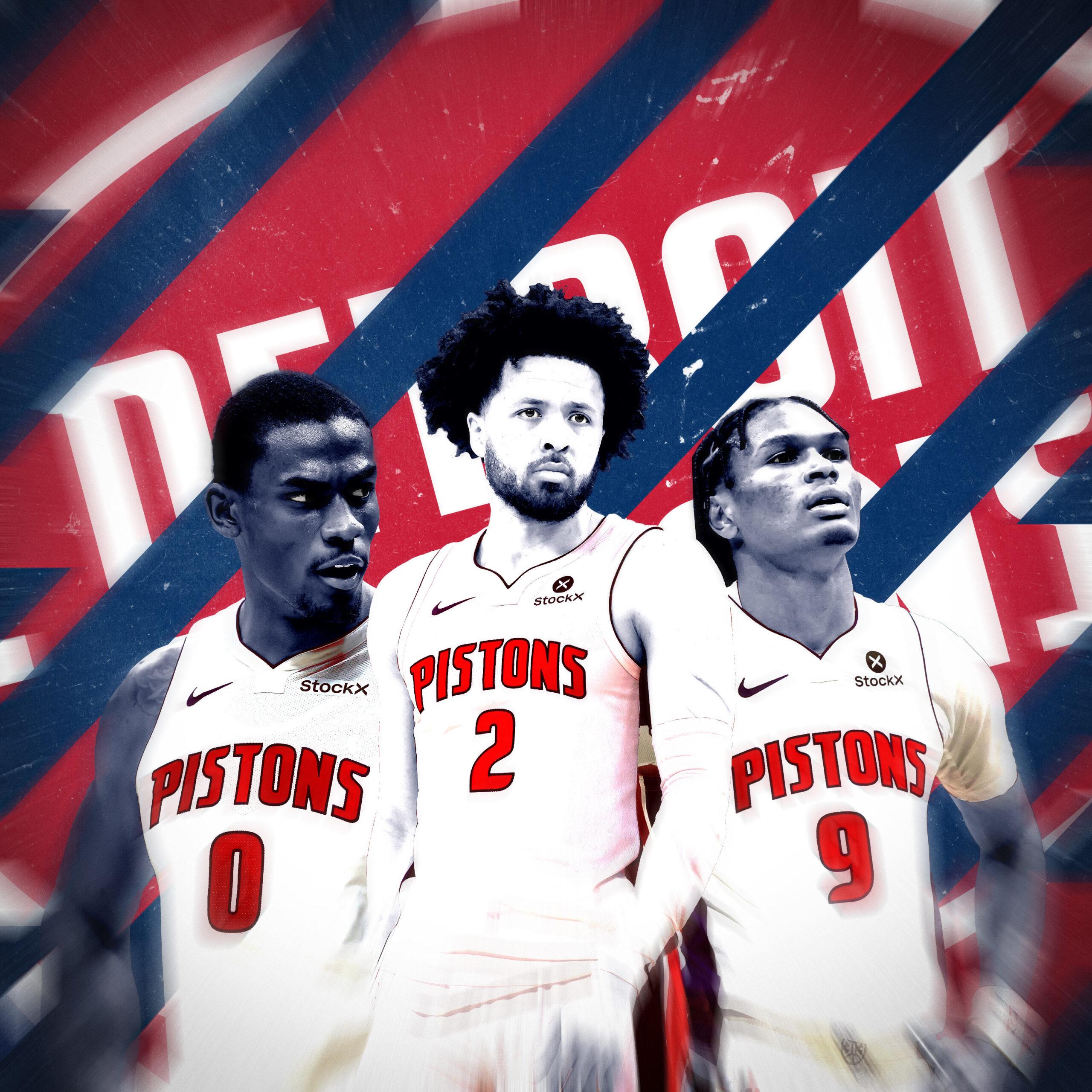
One of the great joys in being a young, frisky, ahead-of-schedule NBA team—other than, you know, the actual winning—is probably the defiance and the gloating. The chance to not so gently remind the world, “You didn’t believe in us, but here we are. Now deal with it.” The Detroit Pistons just had their moment.
“That’s the fun part about it,” Pistons coach J.B. Bickerstaff said earlier this week, as his young team, staring at a 3-1 deficit against the New York Knicks, prepared to take the court at Madison Square Garden. “If you go back to September, October, the odds were stacked against us then. Nobody besides who was in our building believed that we’d even be in this position.”
Fact check: true. According to the oddsmakers, Detroit was supposed to win about 25 games this season. The Pistons hit that mark on February 2 … and they just kept going, eventually reaching 44 victories, more than tripling their total from the prior season. “We’ve overcome a ton of obstacles,” Bickerstaff said, “so why not one more time?”
A few hours later, Cade Cunningham and his young, frisky, ahead-of-schedule pals were celebrating a 106-103 road victory, still alive in their first-round series, still reveling in their defiance, confident they’d take Game 6 at home and earn a return trip to the Garden. “We’ll be back,” Cunningham said.
The joyride ended with a thud in Detroit Thursday night, with the Pistons losing a seven-point lead in the final 2:35, throwing the ball away on their final possession, and falling to the Knicks 116-113. “We felt good about this series,” Cunningham told reporters after the game, “so to not pull it out hurts.”
In the NBA, the breakthrough is always the fun part. Not the easy part, to be clear—after all, Detroit has been waiting 20 years for a team like this—but certainly the most exhilarating. Pistons fans got to watch Cunningham make the leap from promising to dominant, Jalen Duren from intriguing to punishing, and Ausar Thompson from tantalizing to fearsome. They got to revel in one of the best feel-good stories of the season—and the promise of a bright new era. (Say it with me: DEEE-TROIIIT BASKETBALLL!)
The Pistons are here and must be reckoned with. Their three best players are all 23 or younger and crackling with potential. Cunningham should make one of the (soon to be announced) All-NBA teams. Thompson is already one of the league’s premier defenders. Duren is a powerful paint presence who at 21 is just starting to grasp his role. All three shined against the Knicks in high-pressure situations (and without the help of the injured Jaden Ivey and Isaiah Stewart). They should only get better.
Now comes the thornier part: managing expectations while trying to make the next leap.
A young team on the rise is expected to keep rising, to go from 40-something wins to 50-something, from playoff neophyte to playoff fixture. In year one, a first-round battle is refreshing, even if you lose. Stumble in year two, and the anxiety starts to set in. Win a round? Great! Next year, win two. Make the conference finals? Fantastic! Next year, contend for the championship. Fans hate inertia. Owners despise it. And there’s nothing more dangerous than an antsy owner who believes that his young team has arrived.
As one rival team executive said earlier this week, the “no. 1 job” of the Pistons front office now is “to convince [owner] Tom Gores that they’re not knocking on the door. Don’t rush it. Don’t go doing something stupid just because you had a good year. Otherwise, you end up like Atlanta.”
Ah yes, Atlanta, our latest cautionary tale of hubris and impatience in the East. Four years ago, the Hawks were the NBA’s breakthrough darlings, riding Trae Young’s audacious shooting and playmaking to a 41-31 record and a stunning run to the Eastern Conference finals, with victories over the Knicks (4-1) and the Philadelphia 76ers (4-3) along the way. The Hawks lost in six games to the (eventual champion) Milwaukee Bucks. Looking back, it might have been the worst thing to happen to them.
After a respectable 43-win season and a first-round loss to Miami in 2022, the Hawks got antsy—and foolish. Owner Tony Ressler publicly chastised his team, citing “complacency across this organization.” That summer, general manager Travis Schlenk responded by making an all-in questionable trade for San Antonio Spurs guard Dejounte Murray—a deal that cost the Hawks three first-round picks and a pick swap. Five months later, Ressler canned Schlenk and replaced him with Landry Fields. Two months after that, he fired coach Nate McMillan, eventually replacing him with Quin Snyder.
The Hawks’ playoff results since that magical run in 2021? Two first-round exits, followed by two failures to qualify. Last summer, they admitted defeat and traded Murray. Two weeks ago, they fired Fields. They are no closer to title contention now than they were in 2021.
The same curse of unreasonable expectations and owner delusion torpedoed another young, frisky team in Sacramento. The Kings had their breakthrough two years ago, with a 48-win campaign and their first playoff appearance in 17 years. They had the Coach of the Year (Mike Brown), the Clutch Player of the Year (De’Aaron Fox), and the Executive of the Year (Monte McNair) that season. But the Kings soon plateaued, the Western Conference got stronger, and owner Vivek Ranadive got impatient. He fired Brown last December and parted with McNair in April, and in between he signed off on a trade of the disillusioned Fox. Now, the Kings are demonstrably worse off than they were in 2023.
Patience isn’t easy to come by in today’s NBA, but the best franchises know when to exercise it. The Oklahoma City Thunder built steadily, resisted calls to make a blockbuster trade, and are now a favorite to make the Finals. The defending champion Boston Celtics stuck with their young core through every twist and turn, smartly adding talent along the way.
So how will the Pistons handle their newfound success? Will they depart the playoffs happy with their thrilling, unexpected breakthrough, content to keep evolving organically? Or will they leave deflated, testy, and antsy to make a bigger splash? Rival executives speak highly of Trajan Langdon, who just completed his first season as Detroit’s president of basketball operations, and of his staff—in particular Dennis Lindsey, a veteran team executive who played a key role in the Dallas Mavericks’ rise. The Pistons also have strong leadership bridging the basketball and business sides, with former superagent Arn Tellem running the club as vice chairman.
Langdon, who had held secondary front office roles in New Orleans and Brooklyn, had a strong debut as the chief decision-maker in Detroit. He signed ace shooter Malik Beasley, who finished as runner-up for Sixth Man of the Year; landed Tobias Harris, who proved to be the steady vet the young Pistons needed; and traded for Tim Hardaway Jr., who gave the Pistons some experience and scoring punch and proved invaluable when the team lost young guard Ivey to a broken leg in January. At midseason, Langdon swung a trade for Dennis Schroder, who instantly gave the Pistons an added defensive edge. Langdon also replaced coach Monty Williams (after one disastrous season) with Bickerstaff, who instilled a sense of unity and purpose and is a favorite to win Coach of the Year.
This summer, the Pistons have decisions to make about three key vets—Beasley, Schroder, and Hardaway—who will all be free agents. They might be able to retain only two of the three. But they’ll also benefit from the return of Ivey and Stewart and the continued growth of Cunningham, Thompson, Duren, and Ron Holland. Even with modest improvement, the Pistons could crack the top four in the East soon. “They’re a serious threat,” said another rival executive.
Now comes the temptation—to accelerate the process, to leap from good to great now, to make a swing-for-the-fences trade for the next disillusioned star. The rival execs we spoke to earlier this week were consistent in their advice: Don’t. Sure, the Pistons could use a modern, offensively versatile big man to complement Duren and Stewart, as well as more outside shooting. They might eventually have to trade Ivey, an athletic scorer who might not fit with the current group.
“To me it would be too early to make a decision” on what Detroit should add, said the first rival exec. “You need internal growth. Can Thompson learn to shoot? Does Jaden Ivey learn how to play basketball? That changes the dynamics of your team. What does Ron Holland turn into? I would not combine assets to go get [another player]. I would let my young guys develop.”
The Pistons just got here. They can afford to be methodical, opportunistic.
“If I was leading the Pistons,” said the second exec, “I would just play one more year the way it is. I would not push any buttons.”
The owner, of course, might see things differently. Gores addressed the media just before Game 6 on Thursday and invoked the one word that could send shudders through any front office. “Our word in the summer to the players, to our organization, to myself, was ‘urgency,’” he said. “That was win or lose. Our urgency is not going to stop. … That is an organizational motto here. We have to move with urgency.”
Sounds familiar. On the court, the Pistons showed incredible growth this season, particularly over the past two weeks. They had a chance to win Game 1 in New York but fell apart amid a 21-0 Knicks run in the fourth quarter. They rallied back to win Game 2 and momentarily steal home-court advantage. They lost Game 3 by two points, lost Game 4 by one point (there was a missed foul call on the final play, which the referees acknowledged), then rallied once more to win Game 5 on the road. They had a chance to win every game in this series, against a much more experienced Knicks squad, with their last three losses decided by a total of six points.
“The Pistons should have already won the series,” the first rival exec said before Game 6. “They’re a tough team.”
The Gores era, which began in 2011, has been jagged to say the least. He’s on his sixth head of basketball ops and his seventh head coach. There have been too many restarts, rebuilds, and pivots to count.
On the court, the young Pistons have repeatedly proved to be steady, resilient, and brimming with confidence. They’re evolving, maturing before our eyes. The question now is: Has the owner done the same?

